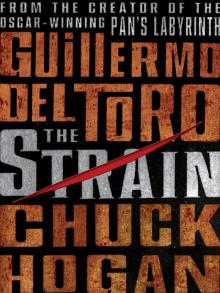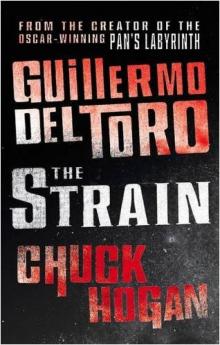- Home
- Guillermo Del Toro
The Shape of Water Page 6
The Shape of Water Read online
Page 6
He considers the secretary, the drink cart. He sighs and steps behind the latter, clapping his hands for attention.
“Good sirs,” he calls out. “What say this afternoon we mix our own drinks?”
They sputter at this interference into their rightful disgruntlement; each man hoists one eyebrow high onto his forehead. Giles knows this feeling, how pique slides toward suspicion. After all this time, he doesn’t know how people so quickly sniff out that’s he different. He thinks he can feel his toupee tape begin to rip free. Should this moment tip wrongly, his rug will be the least of his problems.
“The advantage being,” Giles proceeds, “that we can make them as wet as Baltimore is dry. Who’s for a martini?”
The gamble pays off. Midafternoon businessmen, at their core, are toddlers—dehydrated and cranky—and one man’s Hear, hear is pursued by another’s Amen to that, and in a snap Giles is tending bar, performing speed pours and carving lemon twists to fraternity-house hurrahs. In the midst of the debauch, he gestures everyone aside so he can shake to life a single Brandy Alexander and present it to the secretary like an Academy Award. Everyone applauds, the girl blushes, sunlight skims off the cocktail’s frothy top like a Hawaiian horizon, and for a moment Giles feels as if his world is once more ripe with potential.
11
ZELDA KNOWS WHAT to do. It’s a variation she’s done a thousand times before, at work, certainly, but also all throughout life when pressed by men. Get out of sight, and fast. She adopts the detached smile of a servant, takes hold of her cart, and wheels it about. But the floor is soapy and the carts rolls too widely, striking the trash can and upsetting it with a clatter that bangs about the room. Just emptied, thank heavens, but she scrambles to upright it. Dropping to her knees emphasizes her weight, invites ridicule. She tries to do it quickly. While kneeling, she hears a crinkling sound. She looks up. The man is holding the last thing Zelda expects, the dictionary opposite of his electric rod: a plastic bag of bright green hard candy.
“No, no. Don’t leave. You ladies seem to be chatting enjoyably. Girl talk. Nothing in the world wrong with that. You go right on ahead, I won’t be a second.”
The inflection isn’t southern but has a crocodile’s swishing tail. The man continues forward and for a flash it looks to Zelda that the man is heading for Elisa’s stall. Did Elisa see something in F-1 that Zelda missed? Elisa’s always sensitive to people shouting at her, but her behavior since fleeing F-1 feels different, almost like she’s stunned. Is this man here to drag Elisa away? Zelda hoists herself to her feet, another graceless move, and slides her hand across her cart for a weapon—the kettle brush, the squeegee. She knows about fighting, too. Brewster has more battle scars than her, but she has her share. This man tries to harm Elisa, she’ll do what needs to be done. Zelda’s whole life will be ruined, but she’ll have no choice.
Instead, the man deviates, placing the cattle prod and candy bag on the sink, and steps over to the urinal and begins to unzip.
Now it’s Zelda who looks to Elisa for help. If Zelda’s terrified eyes missed something in F-1, maybe she can’t rely on her eyes here, either. A man, taking out his thing, right in front of them? Elisa, though, is hinging her head left and right and up and down in chase of a suitable reaction. One thing’s for sure: Zelda can’t look at the man. Looking at him, in here, doing this—she has no doubt it’s a fireable offense. All the man has to do is report them, obscene janitors, to Fleming and they’ll be history. Zelda stares at the floor so hard she waits for her gaze to crack the tile.
Urine hisses into the clean urinal.
“Name’s Strickland.” The voice resounds. “I’m heading up security.”
Zelda swallows. “Uh-huh” is all she can manage.
She tells her eyes to stay put, but they stray and see a spurt of urine splish to the mopped floor. Strickland chuckles.
“Oops. Guess it’s a good thing you got mops.”
12
RICHARD WOULD MALIGN her secret sightseeing as a misuse of time, and he’d be right. Her own gasps distract her from her guilt. The linebacker high-rises, mountainous billboards, robot-shaped gas pumps, cheddar-colored streetcars! She feels a knot inside of her fray as if her box cutter is being dragged along it. The bus rushes past signs that stay lit through the daytime drear: WE INSTALL MUFFLERS, $1.00 VARIETY STORE, SPORTING GOODS, JOIN THE AIR FORCE. She rings the bell and gets off at a West 36th shopping district locals call “the Avenue” and lets stores begin jostling for her dollar.
She tries to chime hello to all she passes, especially women. Wouldn’t it be grand to explore the city with a friend who knew its secrets? Who could parry sarcasms about outrageous markups, what the bay-wind does to your hair, all of that? Who could draw from Lainie, and appreciate the special, secret vitality she’d felt during those seventeen months on her own? But Baltimore women are startled by her greetings and barely muster smiles. After an hour, Lainie feels lonely, doomed to outsider status. She gets back on the bus. A man walks the aisle, mistakes her for a tourist, and tries to sell her a visitor’s guide. Her chest reknots. Is it her hairdo? In Florida, beehives were the rage, but not here. She is suddenly, deeply unhappy. She probably needs a visitor’s guide. She buys one.
Baltimore, the guide scolds her, has everything required to satisfy an American family. What exactly, then, is her problem? Tammy would adore the Museum of Art. Timmy would love the Historical Society. West of town is the Enchanted Forest, some kind of storybook attraction. Photos show castles and forests, princesses and witches. The kids could hold their birthday parties there this summer. It’s perfect, except for the park’s so-called Jungle Land. Even the word jungle makes Richard set down the newspaper or turn the channel. They’d just have to be careful where they walked, that’s all.
One of her past strolls took her to the docks at Fells Point. She’s tried to forget this walk, but each morning the Spray ’N Steam sweats the truth out of her; she wonders if the Amazon boiled Richard to his rawest root. It had been a slate afternoon, rhythmed with the whap of ships against docks. She’d toed the edge of the Patapsco River, lifting her collar to her jawline. To get there, she’d gotten off at a bus stop usurped by a rag-clad hobo and walked through the broken bottles of the ugliest neighborhood she’d ever seen. There’d been a movie theater, too, and she’d nearly bought a ticket just to evade the ogling. But the marquee had been missing a few too many bulbs for her comfort, and the movie hadn’t sounded pleasant at all—a circus of souls, something like that.
It was a lonesome spot. No one would hear her if she spoke. So she’d told lies into the cold, lapping water until there were none left to tell: She was happy that her husband had returned. She was fulfilled. She was optimistic about the future. She believed every statistic in the City of Baltimore leaflet Richard had given her. Only twenty percent of Baltimore households, it had boasted, owned a car, and Richard swore to her that one day soon they’d own two. He was sick of his T-bird breaking down, he said, and he wouldn’t have his wife taking public transport while he was off saving the world.
On her way back to the bus stop, in the neighborhood she didn’t like, she’d skirted a city worker spraying off the sidewalk with a hose. How nice, she’d told herself, to see a municipality taking pride in its upkeep. She’d pretended that the washing didn’t dredge up stenches of dog urine, spoiled fish, moldering leaves, congealing sewage, saliferous puddles, scorched oil, bodily excretions. One last lie before heading home, one more wrinkle to iron out.
13
BERNIE LEADS GILES into what Giles hopes is a meeting room but is merely a vacant office inside which has been wedged a table and two chairs. Bernie doesn’t sit, so Giles doesn’t, either. It feels unconvivial after the smiles and handshakes of the waiting room, even as Giles reminds himself that, if he has a friend here, it is Bernie Clay, not those rich old men in the lobby slurping down his mixed drinks. Bernie was part of the vote that kicked Giles out of the firm twenty years ago, it’s true, but hi
s heart hadn’t been in it, and Giles reminds himself of the futility of martyrs—Bernie’s family had to eat, too, didn’t they?
Memories of the inciting event deject Giles, mostly because of its pedestrian predictability; clichés are anathema to any artist. That certain bar in Mount Vernon, the police storming in with raised badges. During the night he spent in jail, he’d thought of one thing: how the police blotter had always been his father’s favorite section of the paper. Giles hoped the old man’s eyesight, like his own, had worsened to the point that he couldn’t read the blotter’s small type, and then, when Giles never heard from his father again, knew that it hadn’t. Within a week of being fired, Giles adopted his first cat.
Finagling meetings with Bernie has become a large part of Giles’s job. But how can he complain? No one else at the firm, Mr. Klein and Mr. Saunders included, approves of Giles’s freelance involvement. Giles applies a big, red grin, just like the father in his newest painting. More advertising, he thinks, this time for himself.
“What in heavens happened to Hazel? I never knew her to miss a day.”
Bernie tugs loose his tie. “You wouldn’t believe it, Gilesy. The old broad made doe eyes at a beverage bottler and whoosh. They make off to Los Angeles. Took the account with them, too.”
“No! Good for her, I suppose.”
“Bad for us. That’s why everything’s haywire, so apologies for the room, we’re backed up. You know a good girl, you let me know, all right?”
Giles does, in fact, know a good girl, one whose job at a totalitarian research facility has been going nowhere for years. If only answering phone calls was Elisa’s forte. The few seconds Giles spends musing in silence make Bernie fidget and what’s left of Giles’s spirit sinks. Bernie is alone inside a closed room with a confirmed fruit. As eager as Giles is to jabber about the good old ad biz, he can’t let himself be the cause of this man’s distress.
“Well, here, let me show you the work—”
“I’ve really only got a few—”
Both are grateful for the distracting clank of the case’s buckle and slap of opening leather. Giles sets the canvas upon the table and gestures proudly. But what he feels is panic. Is there something screwy with the overhead lights? The bone structure of the family he painted is too pronounced, like their skin has worn down to an Andrzej polish. And did he really draw four bodiless heads? Did he not see how ghoulish that was? Even the colors look off, except for the gelatin, which, due to his all-night mixing, is the magmatic apotheosis of red.
“The red,” Bernie sighs.
“Too red,” Giles says. “I concur wholeheartedly.”
“It’s not that. Although the father’s lips do look a little … bloody. It’s the color in general. Red’s out. We’re not doing red centerpieces for anything anymore. Didn’t I tell you that? Maybe I didn’t. Like I said, things are haywire. Red’s being axed across the board. The new thing—are you ready? The new thing is green.”
“Green?”
“Bicycles. Electric guitars. Breakfast cereal. Eye shadow. Green’s the future all of a sudden. Even the new flavors coming in, wall-to-wall green. Apple, melon, green grape, pesto, pistachio, mint.”
Giles tries to ignore the quartet of mocking skulls and scrutinizes the gelatin of their desire. He feels so stupid, so blind. It doesn’t matter if Bernie mentioned the color before or not. If Giles had any judgment at all, he would have known better. What kind of ogre’s appetite would be roused by gelatin so red it looked as if sliced from a beating heart?
“It’s not me, Gilesy,” Bernie says. “It’s photographs. Every client who walks through that door today, they want photo shoots, pretty girls holding hamburgers or encyclopedia sets or what have you. They want to be invited to the casting calls to check out the goods. I’m the last guy at this firm selling the bosses on actual art. Great art is great art, that’s what I tell them. And you, Gilesy, are a great artist. Hey, you making any time for your own stuff these days?”
The painting is like key-lime-pie leftovers seen apart from the brilliant lights of Dixie Doug’s: untantalizing. Giles slips it back into his portfolio case. The weight of the case on the way home will bring him none of the comfort it gave on the trip here. His own stuff? No, Bernie. Not for years. Not when he’s busy painting and repainting gelatin that nobody wants, no matter the color of the future.
14
STRICKLAND FEELS THE hot creep of shame. The urine crawling across the slanted floor, it’s too much. He’d meant to spook the janitors. He plans on spooking everyone who laid eyes on the asset tonight. It’s a trick he took from General Hoyt when they were stationed in Tokyo. First time you meet a lesser, show him how little he means to you. As soon as he saw the black janitor, the bent back of the white janitor, the urinal, it all snapped together. But it’s disgusting. Peeing on the ground, it’s what he did in the Amazon. Cleanliness is what he craves now, and here he is, literally pissing on it.
He checks over his shoulder and gets a good look at the little one. She’s got an open face. Clear of all that glop Lainie layers on. This makes him feel worse. He urges his bladder to empty. He looks around for something else to say. Finds the cattle prod. No doubt both women are staring at it. He haggled it from a farmer before departing Brazil. Some peasant who barely spoke English and yet called it “the Alabama Howdy-do.” Really helped him move the asset in or out of the pool when the asset needed encouragement. There’s a fat, dark red drop of blood clinging to one of the two brass prongs. It elongates toward the white porcelain. Another mess about to be made.
He brightens his voice to distract himself from his self-disgust. “That right there is a heavy-duty 1954 Farm-Master 30 model. None of that newfangled fiberglass crap. Steel shaft, oak handle. Variable five-hundred to ten-thousand volts. Go ahead and look, ladies, but do not touch.”
His face heats up. It sounds like he could be talking about his cock. Disgusting, disgusting. What if Timmy heard him talk like this? What if Tammy did? He loves the kids, even though he’s afraid to touch them, afraid he’ll hurt them. All they have to judge him by is what comes out of his mouth. He feels a bloom of anger toward these women for bearing witness to his ugliness. Not their fault for being in this room, of course. But it’s their fault being in this job, isn’t it? For putting themselves in this position? The last drop of urine falls. He thinks of the pregnant bulb of blood hanging from the Alabama Howdy-do.
Strickland hitches his pelvis, tucks, zips his pants with a startling yowl. The women look away. Are there urine spatters on his pants? He’s not in the jungle anymore. He has to think of such things all the time now. He wants to run from this overbright room and the mess he’s made. Wrap this up, he tells himself.
“You both heard what the man said in the lab. I hope I don’t need to repeat it.”
“We’re cleared,” the Negro says.
“I know you’re cleared. I checked.”
“Yes, sir.”
“It’s my job to check.”
“I’m sorry, sir.”
Why is this woman making this difficult? Why can’t the other woman, so much prettier, so much gentler looking, why won’t she say something? The air in the room feels swampy. His imagination, it’s got to be. His heart pounds. He reaches for a machete that isn’t there. The Howdy-do, though. It’ll make a fine replacement. He longs to wrap his fingers around it. He pushes a laugh through clamped jaws.
“Look. I’m not one of them George Wallace folks. I think Negroes have a place. I do. At work, in schools, all the same rights as whites. But you people need to work on your vocabulary. You hear yourself? You keep repeating the same words. I fought right next to a Negro in Korea who ended up court-martialed for something he didn’t do, because when the judge wanted his story he couldn’t say anything but yes, sir and no, sir. That’s why we’ve got so many of your kind in jail. I don’t mean anything personal by it. I heard they’re closing down Alcatraz next month and there’s hardly a Negro in there, and those are the wors
t criminals this country’s got. That’s a credit to your race. You ought to be proud.”
The hell is he talking about? Alcatraz? These janitors must think he’s a nitwit. The second he’s gone, this restroom is going to explode with their laughter. Sweat pours down his face. The chamber is closing in on him, and it must be three hundred degrees. He nods, sees the bag of hard candy, swipes it, fishes inside. He didn’t wash his hands first. Janitors, of all people, will notice that. Disgusting, disgusting. He shoves a green ball into his mouth. Gives the staring women one last look.
“Either of you ladies care for a candy?”
But the green ball is like a horse’s bit. He can’t make out a word of his own question. Oh, they’ll laugh, all right. Fucking janitors. Fucking everyone. He’ll need to be tougher on the scientists, not flub it like he flubbed this. Occam’s no different than the Josefina. He’ll make sure everyone understands that it’s Strickland in charge. Not David Fleming, the Pentagon’s flunky. Not Dr. Bob Hoffstetler, the benign biologist. He turns on his heel. It’s slick. He hopes it’s soapy water, not urine. He bites down on the candy so he won’t hear his own wet footsteps and grabs the Howdy-do off the sink. The bulb of blood, it probably falls. And the janitors will wipe it away. But they’ll remember it. Remember him. Disgusting, disgusting.
15
STRICKLAND’S OFFER OF candy only adds a sick sweetness to the revolting scene. Elisa lost her taste for candy at the age when most children would murder for it. Even the sugary pies Giles forces upon her at Dixie Doug’s scrape at her throat. She recalls the origin of her distaste from a cringer’s perspective, gawking up at adult gorgons every bit as inscrutable as Strickland. In the eyes of these early caretakers, Elisa wasn’t handicapped; she was stupid and recalcitrant. The orphanage had the darling name of the Baltimore Home for Wee Wanderers, but those who lived there slashed it to “Home,” ironic given the attributes that storybooks always associated with home. Security. Safety. Comfort. Joy. Swing sets. Sandboxes. Hugs.

 Cabinet of Curiosities
Cabinet of Curiosities The Complete Strain Trilogy
The Complete Strain Trilogy Trollhunters
Trollhunters The Night Eternal
The Night Eternal The Fall
The Fall The Shape of Water
The Shape of Water The Strain
The Strain The Fall tst-2
The Fall tst-2 Guillermo del Toro's Cabinet of Curiosities
Guillermo del Toro's Cabinet of Curiosities The Strain tst-1
The Strain tst-1 The Strain, the Fall, the Night Eternal
The Strain, the Fall, the Night Eternal